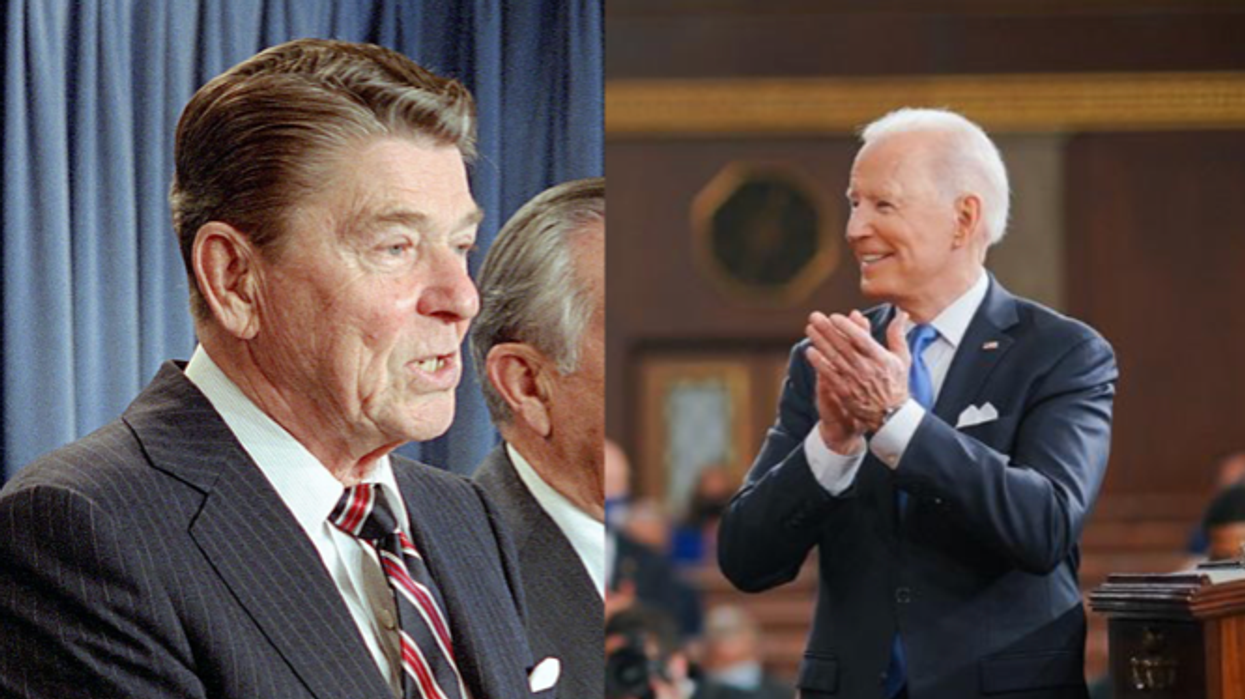
The late President Ronald Reagan, left, and President Joe Biden.
Reprinted with permission from Alternet
Four decades after the Reagan era, the United States has embraced another president who could reshape the ideology behind the size of the American government. A new op-ed published by The New York Times highlights the similarities and differences between President Joe Biden and former President Ronald Reagan.
While Reagan aimed to drastically alter the size of the American government and its spending, it appears Biden plans to embrace the same type of changes — but in reverse. The former senator spent his younger years working with Republicans and other Democratic lawmakers to bring down the government's deficit by curbing spending. But, things are quite different now.
According to the essay by columnist Lisa Lerer, Biden has "put forward a very different approach, one that historians, political scientists and strategists in both parties believe could signal the end of fiscal conservative dominance in our politics"
During Biden's recent speech before Congress, he signaled that his agenda would be "packed with "once in a generation" investments that would touch nearly every corner of American life, everything from cancer research to child care to climate change."
"It's time we remembered that 'we the people' are the government. You and I," Biden said. "Not some force in a distant capital."
When former President Barack Obama took office in 2009, he made it clear that he was completely aware of how Reagan's policies influenced lawmakers' perspective on spending and deficits.
"Ronald Reagan changed the trajectory of America in a way that, you know, Richard Nixon did not, and in a way that Bill Clinton did not," Mr. Obama said during his 2008 campaign. "He put us on a fundamentally different path because the country was ready for it. I think they felt like, you know, with all the excesses of the '60s and the '70s, and government had grown and grown, but there wasn't much sense of accountability in terms of how it was operating."
But despite his awareness, Obama faced a substantial number of hurdles and was ultimately unable to gain bipartisan support for many of his proposed legislation and policies. Subsequently, he too began adjusting his presidential agenda.
However, the silver lining is that the Biden administration may be able to close in the gaps and accomplish some of the initiatives the Obama administration could not.
- Trump's Propaganda Channel Confronts Biden's New Reality ... ›
- Biden Celebrates America 'On The Move Again' As 100th Day ... ›
- Biden Approval Ratings Soar On Vaccine Action And Relief Bill ... ›
- If Biden Were Republican, Press Would Tout Him As 'The New ... ›
- Biden Takes A Victory Lap Around Clueless Beltway Press Corps ... ›
- Biden's Doing Very Well — But Here’s How He Might Do Better - National Memo ›
- Underestimate That ‘Senile’ Biden Guy At Your Peril - National Memo ›
- Editorial: Why all Americans should be rooting for Joe Biden's success ›
- John Podesta: Biden's first 100 days were a complete success ... ›
- Biden's Early Formula for Success: Underpromise and Overdeliver ... ›
- Were Joe Biden's first 100 days in office a success? Our panel's verdict ›
- Joe Biden, the Reverse Ronald Reagan - The New York Times ›
- Joe Biden is the anti-Reagan, as his speech will make clear - Los ... ›
- Bidenomics beats Reaganomics and I should know – I saw ... ›
- At 100 days, Biden seeks to leverage narrow majorities to reverse ... ›








